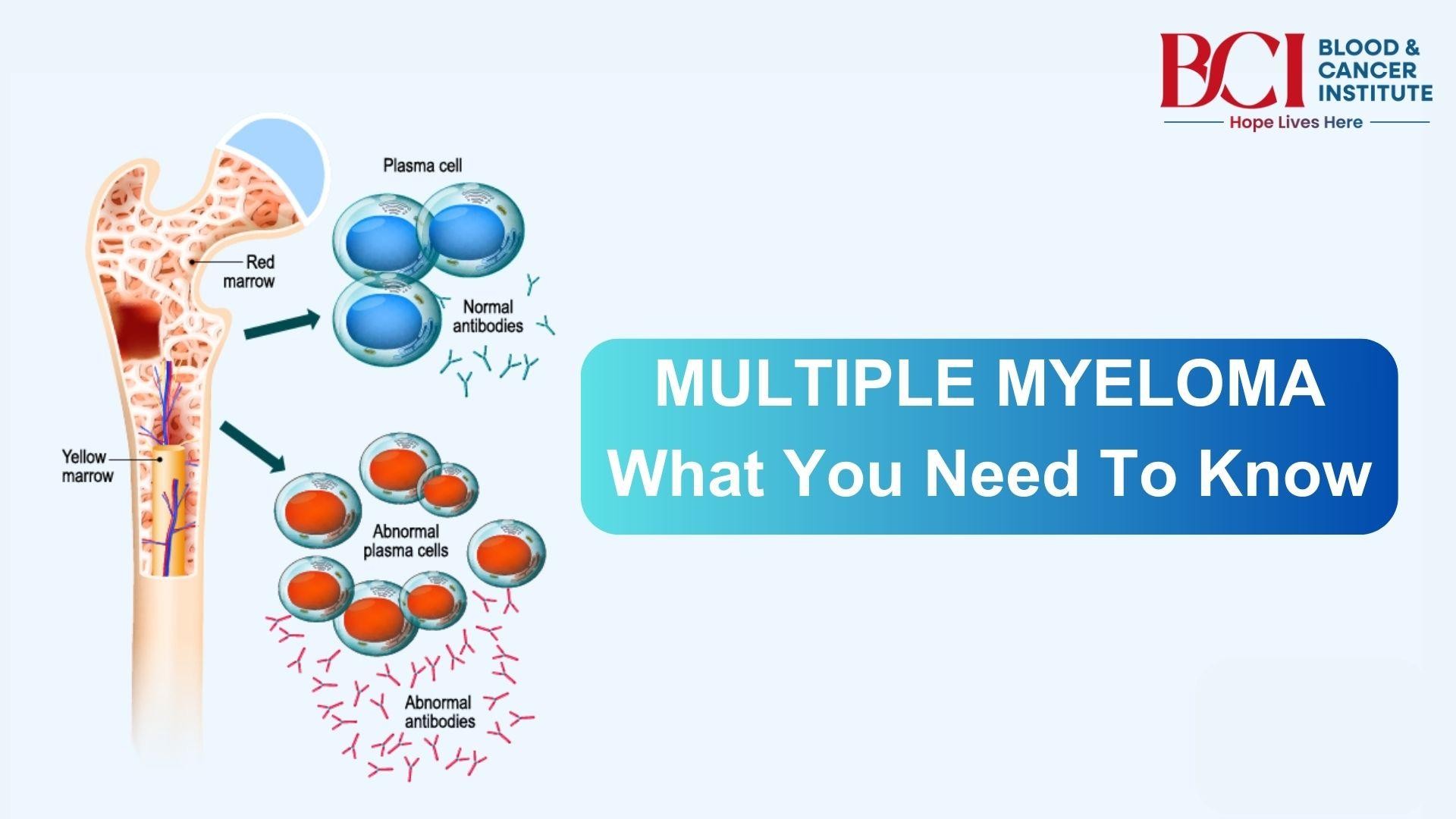
- By : BCI
- Blog
- Comments: 0
Multiple Myeloma: Explained By the Blood Cancer Specialist In Surat
Multiple myeloma is a type of blood cancer that affects plasma cells, a crucial part of the immune system. Plasma cells, found in bone marrow, produce antibodies to help fight infections. In multiple myeloma, these cells become cancerous, multiplying uncontrollably and crowding out healthy blood cells. This disease can weaken the immune system, damage bones, and lead to other serious complications. Our Cancer specialists in Surat, at BCI-Blood and Cancer Institute help us in understanding multiple myeloma — its symptoms, causes, diagnosis, and treatment — for early detection and better outcomes.
What Is Multiple Myeloma?
Multiple myeloma is classified as a cancer of the plasma cells. Normally, plasma cells create antibodies to help the body fight infections. In multiple myeloma, these cells produce abnormal proteins, known as monoclonal proteins or M proteins, instead of functioning properly.
These defective proteins can accumulate in the body, causing damage to the kidneys and other organs. Meanwhile, the overproduction of cancerous plasma cells can disrupt the production of healthy blood cells, leading to anemia, infections, and bone problems.
Symptoms of Multiple Myeloma
Blood cancer specialists in Surat warn that the symptoms of multiple myeloma may vary depending on the severity of the disease and the organs affected. Some common symptoms include:
- Bone Pain: Persistent pain in the back, ribs, or hips is often a hallmark symptom, caused by the breakdown of bone tissue.
- Frequent Infections: The immune system weakens, making it harder for the body to fight infections.
- Fatigue and Weakness: A decrease in red blood cells (anemia) can lead to extreme tiredness.
- Fractures: Bones may become fragile and break easily due to bone loss.
- Kidney Problems: High levels of abnormal proteins can damage the kidneys, leading to issues such as kidney failure.
- Numbness or Tingling: Nerve damage (neuropathy) can occur, particularly in advanced stages.
- High Blood Calcium Levels (Hypercalcemia): Symptoms may include nausea, confusion, constipation, or excessive thirst.
Not everyone experiences all these symptoms, and some people may have no noticeable signs in the early stages.
Who Is at Risk for Multiple Myeloma?
While the exact cause of multiple myeloma is unknown, hemato-oncologists in Surat list several risk factors that increase the likelihood of developing the disease:
- Age: The majority of cases occur in people over 60.
- Gender: Men are slightly more likely to develop multiple myeloma than women.
- Race: African Americans have a higher risk of multiple myeloma compared to other racial groups.
- Family History: A family history of the disease can increase the risk.
- Exposure to Toxins: Prolonged exposure to harmful chemicals or radiation may raise the likelihood of developing multiple myeloma.
- Pre-existing Conditions: People with a condition called monoclonal gammopathy of undetermined significance (MGUS) have a higher risk of progressing to multiple myeloma.
How Is Multiple Myeloma Diagnosed?
Early detection is critical for managing multiple myeloma effectively. The diagnostic process typically involves:
- Blood Tests: Doctors look for high levels of abnormal proteins (M proteins) and other markers, such as elevated calcium or low red blood cell counts.
- Urine Tests: These detect abnormal proteins, known as Bence Jones proteins, in the urine.
- Bone Marrow Biopsy: A sample of bone marrow is examined to confirm the presence of cancerous plasma cells.
- Imaging Tests: X-rays, MRIs, or CT scans are used to identify bone damage or tumors.
The results of these tests help doctors determine the stage of the disease and develop a treatment plan tailored to the patient’s needs.
Treatment Options for Leukemia-Multiple Myeloma
While there is no cure for multiple myeloma, treatments aim to control the disease, relieve symptoms, and improve quality of life. Common leukemia cancer treatment in Surat include:
1. Targeted Therapy
Targeted drugs attack specific molecules involved in the growth of cancerous plasma cells. These therapies, such as proteasome inhibitors (e.g., bortezomib), interfere with the cancer cell’s ability to survive.
2. Chemotherapy
Chemotherapy drugs kill rapidly dividing cancer cells. They are often used in combination with other treatments.
3. Immunotherapy
Immunotherapy boosts the immune system to fight cancer. Monoclonal antibodies or CAR T-cell therapy may be used to target and destroy cancer cells.
4. Stem Cell Transplant
In eligible patients, a stem cell transplant can replace diseased bone marrow with healthy cells. This procedure is often combined with high-dose chemotherapy.
5. Radiation Therapy
Radiation is used to target and shrink tumors or relieve bone pain caused by cancer.
6. Supportive Care
Treatments for anemia, bone pain, or infections can help manage symptoms and improve quality of life.
Coping with Multiple Myeloma
Living with multiple myeloma can be physically and emotionally challenging. Patients undergoing blood cancer treatment in Surat should work closely with their healthcare team to manage symptoms and side effects. Additionally:
● Stay Informed: Understanding the disease and your treatment options can empower you to make informed decisions.
● Seek Support: Join support groups or connect with others who understand the journey of living with multiple myeloma.
● Focus on Wellness: Eating a healthy diet, staying active, and managing stress can improve overall well-being.
Conclusion
Multiple myeloma is a complex disease that requires ongoing management, but advances in treatment have significantly improved outcomes for many patients. Early diagnosis, personalized treatment, and supportive care from the best blood cancer hospital in Surat can help individuals maintain a good quality of life.
